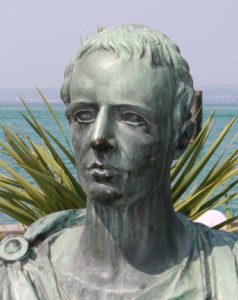Gaius Valerius Catullus (c. 84 – c. 54 BCE) is remembered as the greatest lyric poet of ancient Rome. He was a master of short forms and a sometimes conversational voice. The n. 5 is the most famous of his verses. The n. 51b is thought to be a fragment. The n. 85 sounds quite modern to me.
Catullus is pretty accessible to modern readers so he makes a good introduction to Roman writing.
These translations and the translations of the recipes on another page of the site, are my only translations from Latin. I make no claim to be a translator of Latin, although I did translate these in my usual way, finding an acceptable English meter in the words and not taking liberties with the text.
Catullus, n. 5

A contemporary portrait bust of the Roman poet Gaius Valerius Catullus, at Sirmione on Lake Garda, in northern Italy, the poet’s home town.
Let us live, my Lesbia and let us be in love,
The stern old folks may make their noise about it,
So let us value all of that at just one As. *
Many times the sun will set and rise again:
As for us, with the setting of our brief light,
We will sleep forever in that night.
Give me a thousand kisses, then a hundred
Then a thousand more, then a second hundred
then yet another thousand, then a hundred
Then, with many thousands we shall have had,
We’ll mess up the count so we will not know
And so no one can envy us
For such a great number of kisses.
( * One As was a Roman coin of small value.)
Catullus, n. V (in the original Latin)
Vivamus, mea Lesbia, atque amemus,
rumoresque senum severiorum
omnes unius aestimemus assis.
Soles occidere et redire possunt:
nobis cum selel occidit brevis lux,
nox est perpetua una dormienda.
Da mi basia mille, deinde centum,
dein mille altera, dein secunda centum
deinde usque altera mille, deinde centum.
Dein, cum milia multa fecerimus,
conturbabimus illa, ne sciamus,
aut ne quis malus invidere possit,
cum tantum sciat esse basiorum.
Catullus, n. 51b
Laziness, Catullus, this is your trouble,
Leisure inspires what little you do;
The idleness of kings who once were happy,
The ruin of their kingdoms.
Catullus, n. LI b (in the original Latin)
Otium, Catulle, tibi molestum est,
Otio exultas nimiumque gestis;
otium et reges prius et beatas
perdidit urbes.
Catullus, n. 85
I feel both hatred and love. What causes this, perhaps you ask.
I do not know, yet I do feel this way, and it torments me.
Catullus, n. LXXXV (in the original Latin)
Odi et amo. Quare id faciam, fortasse requires.
Nescio, sed fieri sentio et excrucior.
